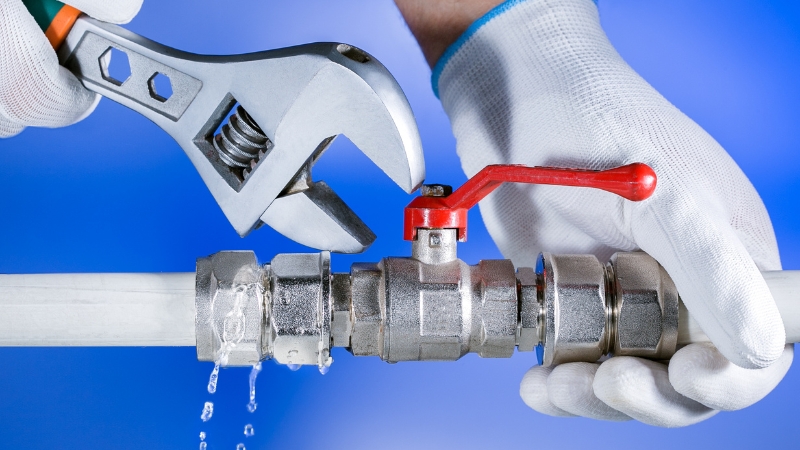Preventing water line leaks is essential for maintaining the integrity of your home, reducing potential water damage, and avoiding costly repairs. Regular detection and early intervention are key to stopping leaks before they escalate into more significant problems.
Table of Contents
Toggle1. Monitor Your Water Bill
Monitoring your water bill may seem like an obvious step, but many homeowners overlook it. Your water bill is one of the first indicators that there may be a leak in your plumbing system. If your usage hasn’t changed significantly but your bill is rising unexpectedly, this is a red flag. The best way to approach this is to track your water bills over time.
How It Works:
When there’s a hidden leak, even a small one, your water meter will register continuous water usage, which will reflect in your bill. Compare monthly bills, and check for unusual spikes in water consumption. If you suspect a leak but can’t locate it, consult a plumber.
Long-Term Benefits:
Monitoring your water usage and bill trends allows for early leak detection. This method helps prevent large-scale damage by catching leaks in the early stages, saving you both money and stress.
2. Check Water Pressure Regularly
High water pressure may feel great during a shower, but it can stress your plumbing system over time, leading to leaks. Water pipes are designed to handle specific pressure levels, and anything above 60 PSI (pounds per square inch) can create excessive strain.
How to Detect It:
You can buy a simple water pressure gauge at any hardware store and check the pressure in your home yourself. Attach the gauge to an outdoor spigot, turn on the faucet, and get an immediate reading. If the pressure is too high, installing a pressure-reducing valve can mitigate the problem.
Why It Matters:
Maintaining appropriate water pressure ensures that your pipes don’t become stressed and develop cracks or leaks. A well-balanced pressure system not only prevents leaks but also extends the lifespan of your plumbing system.
3. Inspect Exposed Pipes and Appliances
Many of the leaks in a plumbing system occur in easily accessible areas, such as around sinks, water heaters, and washing machines. Regular visual inspections can catch leaks in these locations before they become significant.
What to Look For:
Look for signs of moisture, corrosion, or puddling near pipes and appliances. Inspect hoses connected to dishwashers, washing machines, and ice makers for wear and tear. Also, check for rust or dampness on the exterior of water heaters and beneath sinks.
How This Helps:
Regular inspections of exposed pipes help catch visible leaks and prevent water damage to surrounding areas. By replacing worn parts or tightening loose connections, you can prevent larger, more costly issues from developing.
4. Install Leak Detection Devices
Technology offers a convenient way to monitor water lines and detect leaks. Leak detection devices can alert you to problems before they escalate. These devices are placed near vulnerable areas, such as under sinks, near washing machines, or at the base of water heaters.
How They Work:
Leak detectors are either battery-operated or connected to your home’s power supply. They sense the presence of water or changes in moisture levels and send an alert to your phone or sound an alarm in your home.
The Advantages:
Installing these devices allows for real-time detection of leaks, even when you’re not home. Many smart leak detectors can shut off the water supply when a leak is detected, preventing widespread damage. This immediate response can save thousands in repair costs.
5. Schedule Annual Plumbing Inspections
Just like you schedule annual checkups for your health, your home’s plumbing system needs regular professional evaluations. A plumber will use advanced tools to assess the condition of your pipes and identify potential leak risks.
What Happens During an Inspection:
A professional plumber will check water pressure, inspect exposed pipes, and use specialized equipment like infrared cameras or acoustic listening devices to detect leaks behind walls or under floors. They may also inspect your main water line, which is especially prone to wear and tear.
Why It’s Essential:
An annual plumbing inspection is proactive maintenance that can catch minor issues before they turn into major headaches. Professional inspections often detect hidden leaks that a homeowner may not notice, safeguarding your home from unexpected water damage.
6. Perform Regular Maintenance on Water Appliances
Water heaters, dishwashers, and washing machines are common sources of water leaks. Regular maintenance of these appliances can prevent leaks from occurring due to wear and tear or mechanical failure.
Steps to Take:
Flush your water heater once a year to remove sediment buildup, which can cause corrosion and leaks. Check hoses and fittings on dishwashers and washing machines for signs of deterioration, replacing them as needed.
Benefits of Maintenance:
Routine maintenance ensures that your appliances are functioning efficiently and minimizes the risk of sudden leaks. This not only extends the lifespan of your appliances but also saves you money on energy and water usage.
7. Upgrade Old or Faulty Plumbing
Old pipes, especially those made from galvanized steel or cast iron, are prone to corrosion and leaks. If your home has aging plumbing, it’s wise to consider replacing it with more durable, modern materials like PEX or copper.
Recognizing Faulty Plumbing:
Inspect older pipes for signs of rust, discoloration, or frequent leaks. Pay attention to water quality as well—brown or rusty water can be a sign that your pipes are deteriorating. If your plumbing system is more than 50 years old, consider an upgrade.
Why It’s Important:
Upgrading outdated plumbing prevents chronic leaks, improves water flow, and protects your home from the costly damage that can arise from burst pipes. Though the upfront cost of replacing pipes may be high, it’s a worthwhile investment in long-term safety and efficiency.
8. Utilize Water Softening Systems
Hard water can cause mineral buildup inside pipes, leading to blockages and leaks over time. Installing a water softening system reduces the presence of minerals such as calcium and magnesium in your water.
How It Works:
A water softener replaces hard minerals with softer sodium ions, which reduces the chance of scale forming inside pipes and appliances. This prevents clogging and subsequent leaks.
The Benefits:
Using a water softener prolongs the life of your plumbing system and prevents leaks caused by mineral buildup. This can also improve the efficiency of appliances like water heaters, making your home more energy-efficient.
9. Keep Drains Clear of Debris
Clogged drains can lead to increased pressure in your plumbing system, which can cause leaks or burst pipes. Ensuring that your drains are free of debris is a crucial step in leak prevention.
How to Do It:
Use strainers in sinks and tubs to catch hair, food particles, and other debris. Avoid pouring grease, oil, or large food particles down the drain. Additionally, using a natural drain cleaner once a month can help keep your pipes clear.
Long-Term Protection:
By keeping your drains clear, you maintain optimal water flow and prevent backups that could lead to leaks. This simple practice not only preserves your plumbing system but also reduces the likelihood of emergencies.
10. Know the Location of Your Main Water Shutoff Valve
In the event of a major leak or pipe burst, turning off the water supply quickly is critical to minimizing damage. Knowing the location of your main water shutoff valve allows you to act fast in emergencies.
Why It Matters:
When a pipe bursts, every minute counts. If you can quickly shut off the water, you reduce the amount of water that floods your home, minimizing water damage and repair costs.
How to Prepare:
Locate your main shutoff valve and ensure all family members know how to operate it. Test it occasionally to make sure it’s functioning properly, and ensure it’s easily accessible.
Conclusion
Preventing water line leaks is all about taking proactive measures to monitor your plumbing system and address small problems before they become major issues. By implementing the 10 strategies outlined in this guide, you can protect your home from water damage, save on costly repairs, and ensure your plumbing system operates efficiently for years to come.
Regular monitoring, inspections, and maintenance are essential to keeping your pipes in top condition. Whether it’s something as simple as checking your water bill or as comprehensive as scheduling annual plumbing inspections, each of these methods plays a crucial role in preventing water line leaks.
Experience the Ultimate Solution for Water Line Leak Detection with Garcia Home Restoration!
At Garcia Home Restoration, we know the frustration and potential damage that hidden water line leaks can cause. Our expert team specializes in water line leak detection, ensuring that even the smallest leaks are quickly identified and resolved before they lead to more serious problems.
Our mission at Garcia Home Restoration goes beyond simply fixing leaks; we focus on improving the overall efficiency of your plumbing system, helping you avoid costly repairs and excessive water bills. With a solid reputation across Contra Costa County, we are trusted for our expertise, attention to detail, and commitment to delivering exceptional plumbing services. Don’t let an undetected water line leak cause unnecessary damage or expenses. Contact us today for top-quality water line leak detection services and enjoy the peace of mind that comes with a properly maintained plumbing system!




